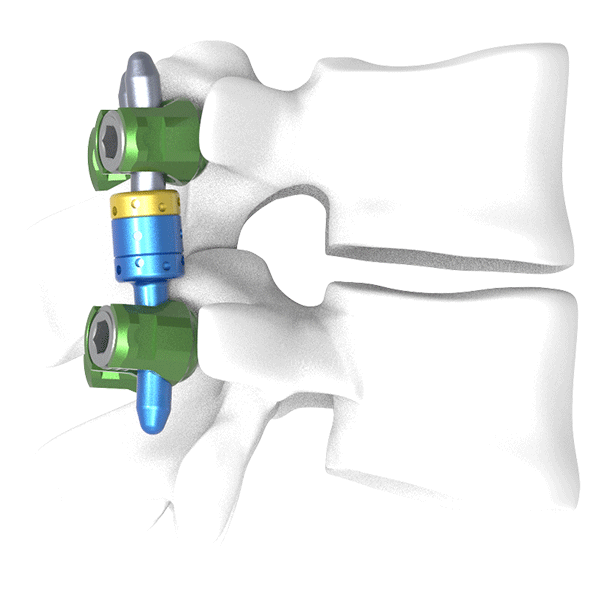Investigation and Development
The Integrated Neurosurgery Unit of the Equipo de la Torre, directed by Doctor Mr Manuel de la Torre, is a pioneer in using neuronavigation and spinal stabilisation with the so-called Dynamic Stabilisation Bar, among other surgical techniques in the field of complex spinal surgery.
One of the latest developments is that of the following technique, considered highly effective for the patient as it allows mobility in all the turns of the treated area and, therefore, greater possibilities of recovering the quality of life they had before surgery.
Transpedicular arthrodesis with dynamic lumbar system

The increase in lumbar pathologies in the active young population has increased considerably in recent years. At the Neurosurgery Unit of Equipo de la Torre, we have promoted the search for new alternatives for lumbar stabilisation that allow patients to quickly return to their work and sporting life without reducing the mobility of the spine, and the need to reduce the incidence, in the medium or long term, of pathology in the adjacent segment in young or middle-aged patients.
The results of the latest retrospective studies support the success of this technique. In 18 months (January 2016-June 2018), our surgical team operated on 124 patients with this technique. All the surgeries were performed with intraoperative O-arm neuronavigation, registration of potentials and dynamic bars with transpedicular arthrodesis systems. The result was the implantation of 744 transpedicular screws with dynamic bars, an average and mode of 4 screws per patient; the average age was 43 years. The average duration of the surgery was 90 minutes, and the hospital stay was 5.3 days.
Satisfaction with this procedure among patients with transpedicular arthrodesis is 95.3%, between very and completely satisfied, which coincides with the degree of acceptance in the event of repeating the procedure. The evolution so far has been satisfactory, with no pathology of the adjacent segment.
Excellent results are based on a proper diagnosis and purifying and individualising the treatment for each patient. The expertise and experience of the surgical team, besides the appropriate use of image technology, the state-of-the-art screw and registration system considerably increase accuracy and significantly reduce hospital stays.
Complex spinal surgery
The increase in the number of elderly patients, often with osteoporosis and/or a history of previous surgery, and with associated pluripathology, has led to complex neurosurgical surgery of the lumbar spine, based on new minimally invasive techniques. The experience and training of a multidisciplinary team, highly specialised in spinal surgery, and using technology such as intraoperative CT scan , neuronavigation, recording of potentials and using cemented screws, have given rise to new techniques that minimise the risk of complications inherent in the surgical procedure, reducing surgery time, hospital stay and increasing good long-term results.
The latest studies, presented at the last edition of the Congress of the Spanish Society of Neurosurgery (SENEC), place us at the forefront of the technique. Only in the specific case of complex lumbar spine surgery with cemented screws, 1488 transpedicular cemented screws have been successfully implanted from January 2016 to August 2018, with an average of 6 screws per patient in 248 patients; the average age was 76 years. The average duration of the surgery was 145 minutes, and the hospital stay was 5.3 days.
NEUROSURGICAL
C/ Modesto Lafuente, 14 28010, Madrid
C/ La Salle, 12 28023 Aravaca Madrid
Phone: (+34) 911 089 090
FOUNDATION
C/ Montalbán, 3, 3º
28014 Madrid
Phone: (+34)911 089 090
Copyright © 2023 Equipo de la Torre. All rights reserved.



